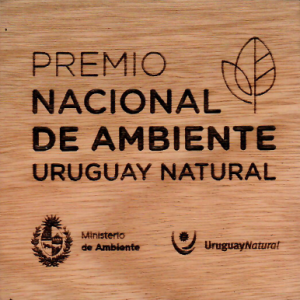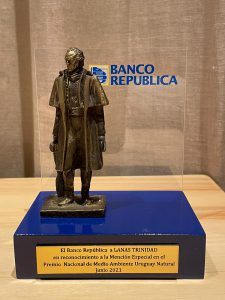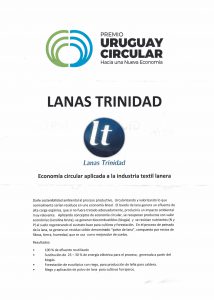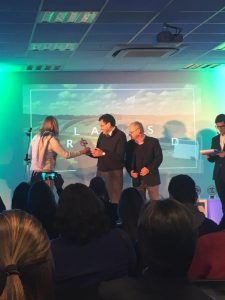We are pleased to announce that we have received the prestigious Sustainable Management seal granted by LATU-UEU Laboratorio Tecnológico del Uruguay & Unión de Exportadores del Uruguay, reaching level 4 (the highest level awarded this year) on a scale of 5 levels.
This recognition is a testament to Lanas Trinidad’s unwavering commitment to sustainability and excellence in business management. We are proud to be recognized for our sustainable practices, which range from production to our daily operations.
In the 4th June, 2021, Lanas Trinidad has been recognised by the Uruguayan Ministry of Environment for its contribution to the protection and improvement of its influence on the environment.
We are so glad to receive this recognition after many years of hard work.
Moreover, we are glad to thank BROU for the present they sent us on the ocassion of the recognition received.
Our goal is clear, we have to deliver future generations a better environment than the one we inherited.
In the world´s environment day, Lanas Trinidad was recognised with the 2019 Circular Economy award by Uruguay, in the large companies category. The award was granted by ANDE (National Agency for Sustainable Development) and PAGE UN (Partnership for Action on Green Economy, United Nations program).
It was the first time that the award was delivered in Uruguay and in Latin America.
Lanas Trinidad is the main producer and exporter of scoured and combed wool tops in Uruguay. Located in the city of Trinidad, the company processes 12,000 tons of greasy wool per year.
Lanas Trinidad is renowned for having a high-quality and environmentally sustainable production process unique worldwide.
What makes Lanas Trinidad different?
The company distinguishes itself from other industries that apply similar processes across the world in the application of a circular economy in its processes and production to attain environmental sustainability.
What does this mean?
In order to understand this, lets first explain the concept of circular economy and its principles.
The circular economy is based on the optimisation of resources and the recovery of waste, promoting the reuse and recycling of materials to their maximum extent.
This concept involves the following three fundamental principles:
- Designing the production to minimize waste and pollution.
- Increasing the life cycle of the elements produced and the materials in use.
- Regenerating and restoring natural systems.
This economic-productive model not only allows the creation of new raw materials from waste, which are transformed into new products and generate new sources of income, but also reduces environmental impact, including carbon emissions, and creates new job opportunities.
Lanas Trinidad ventured on this path in the 1990s, and it was certainly not an easy start. Firstly, because the abovementioned practices were unknown in the field of wool at the time. And secondly because, from an academic point of view, there was nowhere to learn about this subject. It has been a long journey of trial and error in the development of new practices and techniques which, with time, allowed us to gain the necessary experience to direct our actions towards a circular economy model. This is a never-ending experience. We are constantly learning and continue perfecting our work philosophy day by day.
How do we manage to bring these ideas forward?
- So far, there is no other way to obtain high quality tops and/or scoured wool without using a high amount of water to wash the wool, especially with the aim to reach the most demanding markets as is the case with Lanas Trinidad. For this reason, in 1997 the company built a dam of 1,000,000 cubic metres. The dam is filled with rainwater which feeds the plant by means of a 7 km long aqueduct. This allows us to use 100% rainwater which is a natural and renewable resource. No drinking water is consumed from the city or groundwater basins, and neither is water pumped from rivers or lakes. Furthermore, in the scouring and combing process, 100 % of the detergents and additives used are organic and biodegradable.
In addition to this system for scouring wool, our way of processing the effluents generated in the industrial process also sets us apart in the industry of wool.

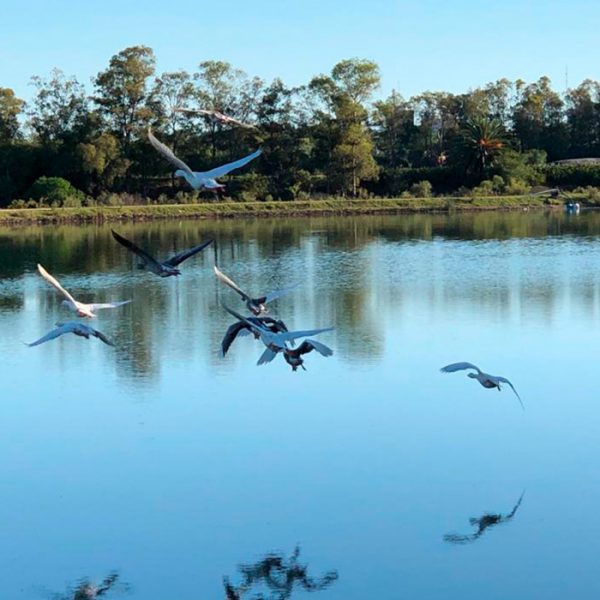

The scouring process produces an effluent with a high organic load which, if not treated properly, causes a significant and negative environmental impact. Applying the concept of circular economy, the first step in the treatment of effluents is the recovery of wool grease. By using centrifuge machines, we manage to obtain this raw material which is then sold to customers in the pharmaceutical and cosmetics industries for creams and beauty products.
After the wool grease is extracted and used, the remaining effluent is biologically treated anaerobically and aerobically in our own 140-hectare field which is located 2 km away from the plant. Through this process, bacteria naturally degrade the effluent resulting in the production of a biogas rich in methane gas. This is why, in 2012, Lanas Trinidad built a lagoon (a biodigester the size of a football pitch) covered with a polyethylene membrane which allows to capture the biogas generated within. The capture of this biogas has two purposes: firstly, to reduce greenhouse gas emissions by more than 95%. Secondly, to generate renewable energy based on methane. This gas has a high energy content and thus is flared in a generator to produce electricity. This energy, which is 100% natural and renewable and obtained from the industrial effluent, covers 25-30% of the plant’s consumption.
The effluent is further purified in 20 different aerobic lagoons. At the end of this process, the resulting effluent water meets all standards and legal provisions for discharge into open water. Nonetheless, this effluent is very rich in nitrogen and phosphorus which makes it a very good bio-fertiliser, and is thus used for the agricultural irrigation of our own trees. Furthermore, this reduces the growth cycle of trees, which will then be cut down to feed the plant’s boiler. This is how we generate our own biomass from a renewable fuel.
The final effluent, after undergoing a biological treatment, is also used to irrigate fodder crops to feed sheep and cattle. Hence, we manage to close the whole cycle without the need to discharge wastewater from our production process into open water.
Additionally, the wool combing process generates a solid residue known as wool dust. This residue, composed of small pieces of fibre, dust, and water, is an excellent bio-fertiliser which is very rich in nitrogen and can be used as a substitute for traditional nitrogen fertilisers such as urea. Another advantage is that wool dust is long-lasting. Instead of requiring an annual application, as is the case with synthetic fertilisers, the fertilising effect of wool dust lasts between 3 and 4 years. What is more, wool dust improves the soil structure by helping plant roots grow and also enhances soil health. Its use contributes to the increase of the carbon stock retained in the soil. This, together with the slow degradation of the keratin in the wool, helps lower the global carbon dioxide level in the atmosphere, thus helping reduce global warming. All of the above makes it a product highly demanded by rural establishments in the area.
As a consequence of the efficiency of the effluent treatment processes and the plant’s capacity, Lanas Trinidad has been providing treatment services to other industries that have compatible industrial effluents for many years.
Lanas Trinidad also carries out different social activities in line with the circular economy principles, such as the following:
-
- school and university visits to promote and disseminate a circular economy success story.
- develop different activities that contemplate the regeneration of natural systems and at the same time are inclusive. For example: replanting native trees with the children of company employees, cultivation of species in demand by local artisans such as reeds and cattails, among others.
- agreements with neighbors to allow sheep, cattle and horses to enter the effluent area to feed their animals (silviculture).
- provide technical advice to neighboring farmers for the incorporation of bio-fertilizers and irrigation.
Our commitment is to deliver future generations a better environment than the one we inherited.



